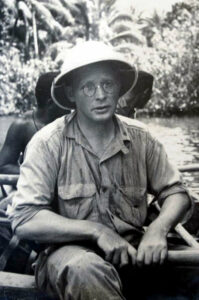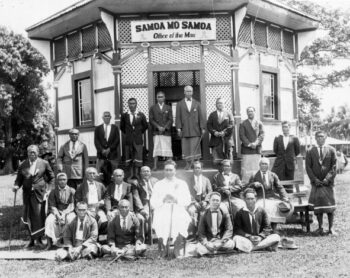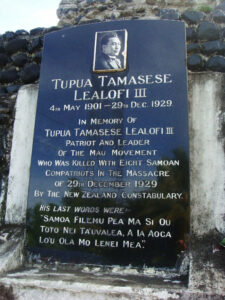Introducing Fr Joseph Deihl SM

Photo: Agnes Sasse Heeney Collection
Fr Joseph Roch Deihl was born on 12 July 1895 in Atlanta, Georgia, USA. When his mother died, he lived in an orphanage in Washington, Georgia, where, by chance, he met a Marist priest. Attracted to Marist life and after studies in a minor seminary, Joseph made his profession as a Marist in 1918 and was ordained to the priesthood in 1920. He left almost immediately for the missions. He was the first non-Frenchman appointed to Samoa and the second missionary from the USA to minister in Oceania. [1] For twenty-eight years, he lived in Apia, Samoa. He founded the Catholic Club to bring a greater sense of belonging to the Catholic community and was the Apia Rugby Union president.
Fr Deihl, known as ‘Tili’ [2] in Samoa, played a significant part in Samoa's 'Black Saturday,' when New Zealand policemen shot and killed eleven Samoans in front of the courthouse on Beach Road. The Mau movement -- O le Mau a Samoa -- 'the firm opinion of Samoa' with its slogan, Samoa Mo Samoa -- 'Samoa for Samoans' – sought Samoan independence from New Zealand.
On 29 December 1928, Fr Deihl had followed a parade of about seven hundred members of the Mau movement, led by the Vaimoso band, from the priests' house at Mulivai, in his green Model A Ford. The police opened fire from the upstairs balcony of the police station with Lee Enfield rifles and a machine gun.
Louisa Sasse and her daughter Agnes, seven years of age at the time, saw what happened from the balcony of their family store over the road. Also present were Agnes's cousins, Karen and Christian Hellesoe. Interviewed in 2007 when she was 85, Agnes related how Fr Deihl drove his car into the scene of the shootings:
"He must have squeezed it down an alleyway which ran down the western side of our house. It took him to within a few metres of the police station. We all knew Father Deihl as we attended the Catholic Church. He jumped out and ran towards the police, holding out his arms and yelling at them. Words like, 'Stop it, stop it, they're human beings!' He kept yelling and waving until they stopped. Karen and Christian always
said that he was the man who had stopped the shooting."

Tupua Tamasese Lealofi III, [seated, in white] with Mau leaders in front of Mau office in Vaimoso, 1929
"I was pretty hot under the collar after that affair in the street when the Samoans were killed, for I rushed out to the village [Vaimoso] to administer to the dying – and the cries of the women and children, the pitiful shrieks, heart rending I should say, with the sight of the wounds from which some were dying and others but promising to hold out a little while, these things must have unnerved me, for when I got back I was so strong in my language that the Bishop had to say, 'Shhh! If anyone hears you talking like that, you'll be sent to jail.'
I told the Bishop [3]flatly that jail or deportation didn't worry me, that I would somehow relish deportation these days." It was indicative of Fr Deihl's modesty that he did not mention to Bishop O'Brien how he had intervened at the police station.
Fr Deihl later wrote of how happy he was in Samoa, remarking that he was "quite prepared to believe that few native races in the world can compare with the Samoan for fineness of physique, cleanliness of habits, and for generosity and hospitality."

The tomb of Tupua Tamasese Lealofi III. The Samoan inscription reads,
"My blood has been spilt for Samoa. I am proud to give it.
Do not dream of avenging it,
as it was spilt for peace."
Because he was wary of the New Zealand administration, Fr Deihl destroyed most of his private papers before leaving Apia for medical treatment in the USA in 1948. He died there after a few months, aged 53.
There is a tribute to him in the December 1948 Marist Messenger, which reads, in part, "Fr Deihl wielded a facile and brilliant pen and did not spare himself in that apostolate. The 'Messenger' benefitted considerably by his regular contributions, replete with information and aflame with his own vivid personality. He knew what it was to plough a lonely furrow and to keep his hand to the plough when the going was tough and his heart went out especially to those who shared his experience."
There are very few issues of the Marist Messenger from 1933 until 1947 that do not include an article about the Catholic missions in the Pacific written by Fr Joseph Deilh. In 2022, the magazine will carry occasional articles based on his writings.
[1] The first was Fr Ḗlie Bergeron, who arrived in Tonga in 1919.
[2] Pronounced ‘Tee-lee.’
[3] Bishop Joseph Darnand SM (1879-1962)
 Entries(RSS)
Entries(RSS)